30+ Sample Affidavit of Death
-
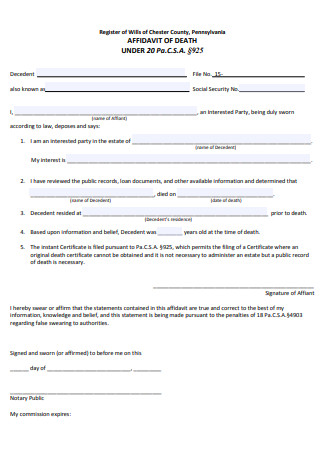
Affidavit of Death Template
download now -
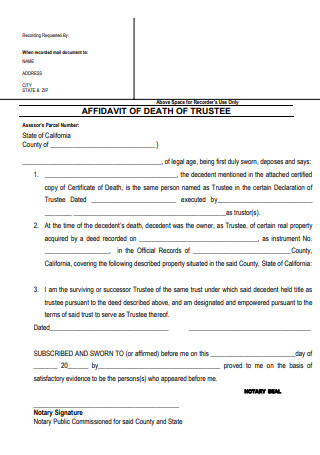
Affidavit of Death of Trustee
download now -
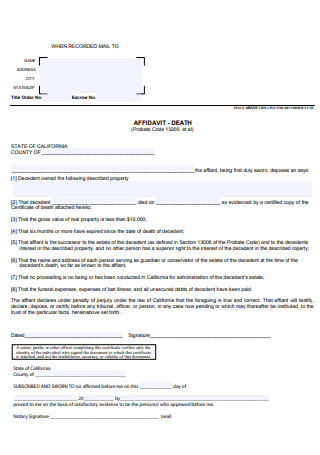
Formal Affidavit of Death
download now -
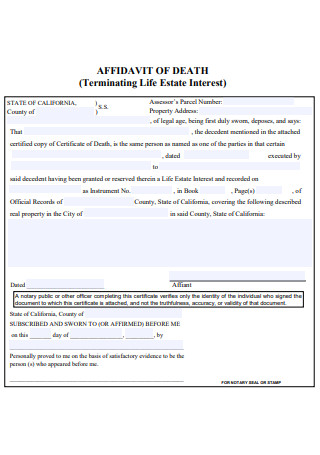
Affidavit of Death Example
download now -
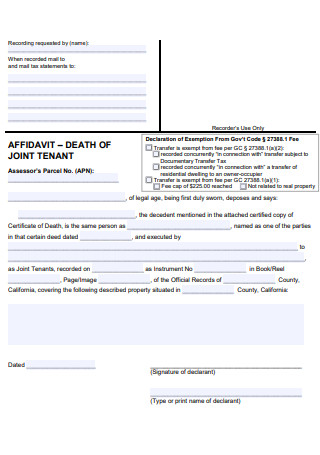
Affidavit Death of Joint Tenant
download now -
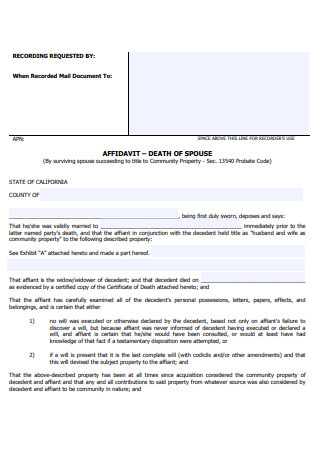
Affidavit Death of Spouse
download now -
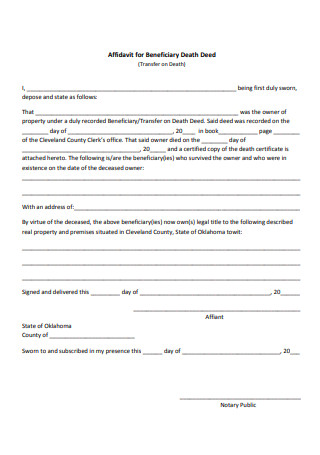
Affidavit for Beneficiary Death Deed
download now -
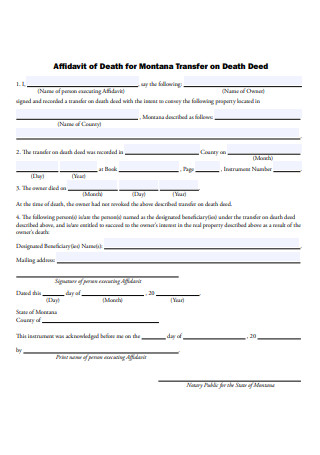
Affidavit of Death for Transfer on Death Deed
download now -
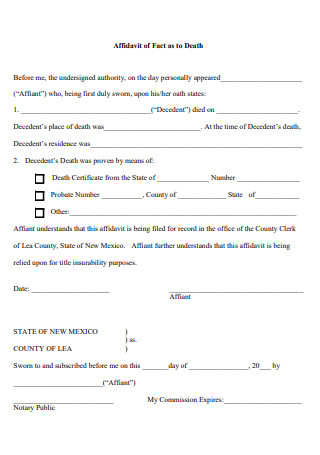
Affidavit of Fact as to Death
download now -
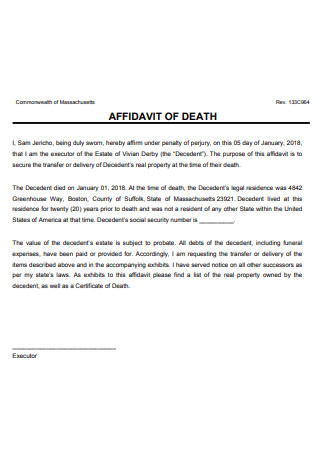
Basic Affidavit of Death
download now -
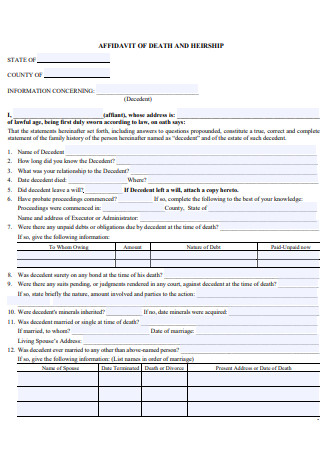
Affidavit of Death and Heirship
download now -
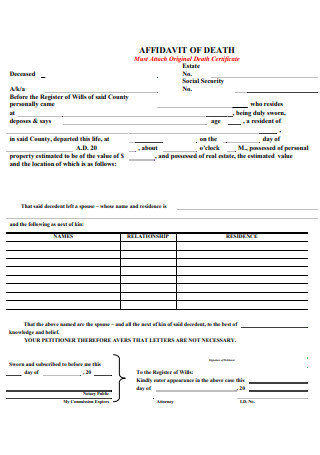
Printable Affidavit of Death
download now -
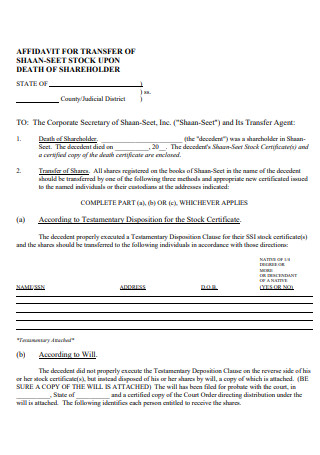
Affidavit of Death of Shareholder
download now -
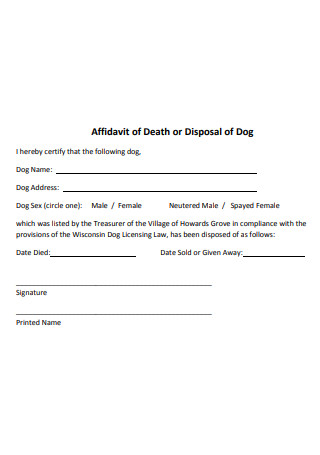
Affidavit of Death or Disposal of Dog
download now -
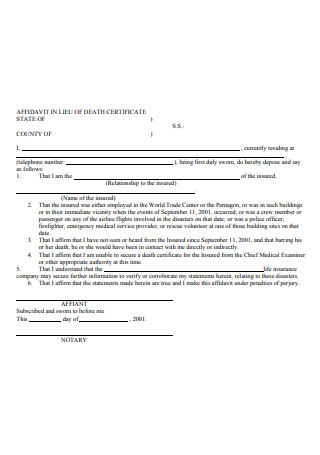
Affidavit in Lieu of Death Certificate
download now -
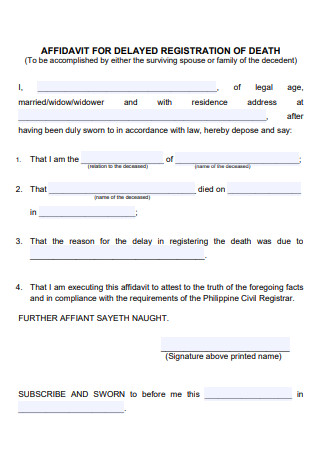
Affidavit for Delayed Registration of Death
download now -
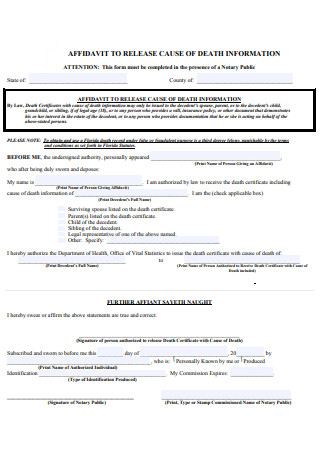
Affidavit to Release Cause of Death
download now -
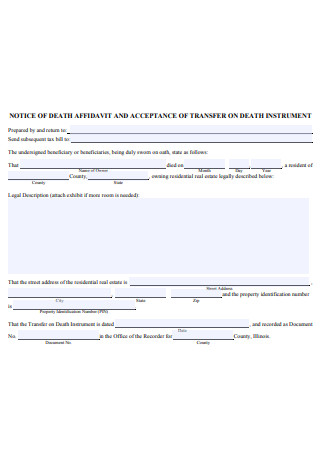
Notice of Death Affidavit
download now -
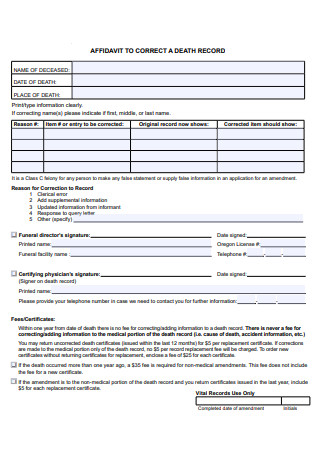
Affidavit to Correct a Death Record
download now -
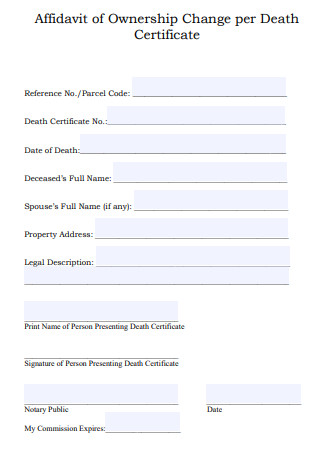
Affidavit of Ownership Change Death Certificate
download now -
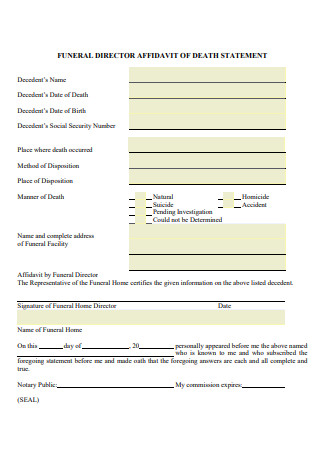
Affidavit of Death Statement
download now -
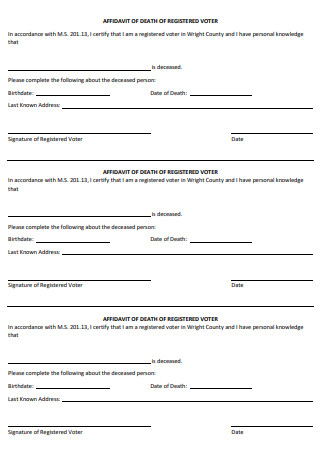
Affidavit of Death of Registered Voter
download now -
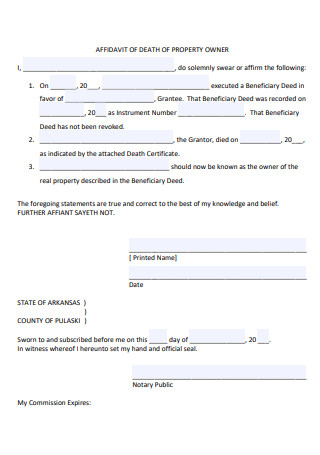
Affidavit of Death of Property Owner
download now -
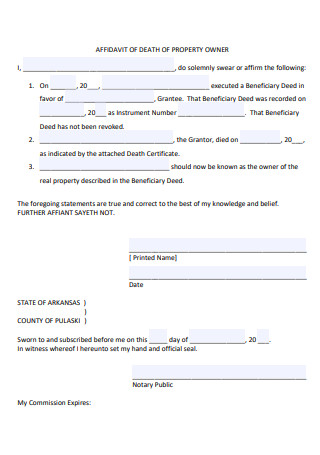
Transfer on Death Confirmation Affidavit
download now -
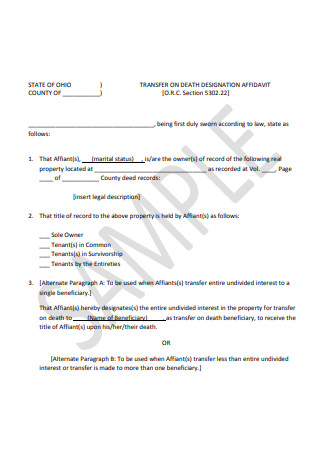
Sample Affidavit of Death
download now -
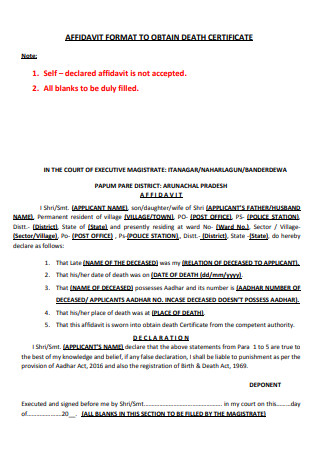
Affidavit of Death Format
download now -
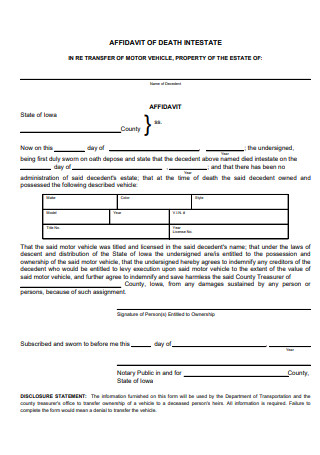
Affidavit of Death in PDF
download now -
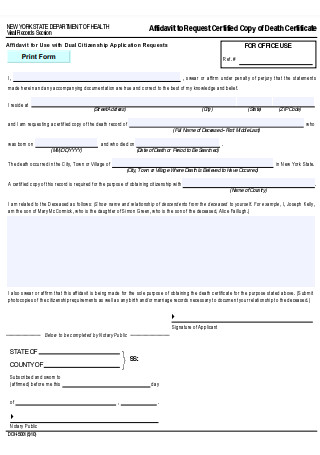
Affidavit to Request Certified Copy of Death Certificate
download now -
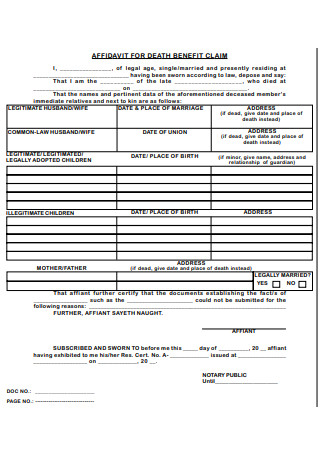
Affidavit For Death Benefit Claim
download now -
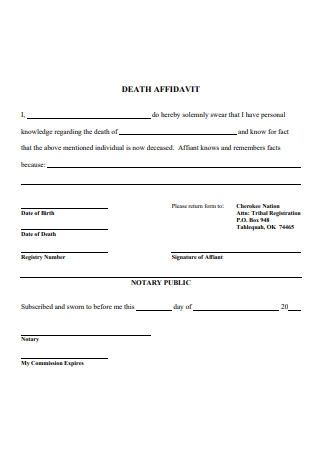
Standard Affidavit of Death
download now -
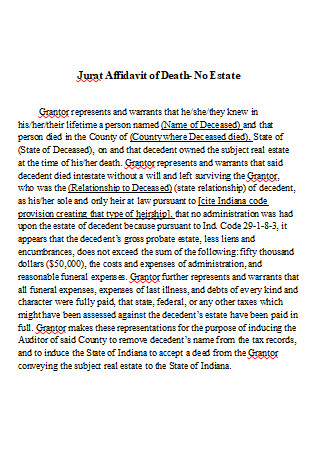
Affidavit of Death in DOC
download now
FREE Affidavit of Death s to Download
30+ Sample Affidavit of Death
What Is an Affidavit of Death?
Types of Situations When an Affidavit of Death Is Needed:
How to Create an Affidavit of Death?
FAQs
How would I be able to know that I need an Affidavit of Death?
My spouse is threatening to claim that I am dead in order to claim my properties and bank accounts, is this legal?
How would I be able to get a certified copy of the death certificate in order to accompany the affidavit of death?
What are the consequences of not having an affidavit of death?
Does an affidavit expire?
What Is an Affidavit of Death?
An Affidavit of Death is used in order to inform businesses, courts and other places to swear that a person is dead. This legal document is a sworn statement that can legally state that someone has already passed away and can be submitted or used to inform insurance companies, banks, businesses or any other organizations that the person has already died. This affidavit can allow a family member or the beneficiary to receive their death benefits sooner and take the ownership of the inherited property or close the deceased’s existing accounts from any banks or organizations. This can only be used once it is written and signed by a notary public. Although an Affidavit of Death is not a death certificate, it can be used in conjunction with a certified death certificate. This type of Affidavit can only be written and signed by someone who is close or has first-hand knowledge of the person’s death.
Types of Situations When an Affidavit of Death Is Needed:
An Affidavit of Death is most commonly used in situations wherein it involves the transfer of the name of the property or the property itself from the decedent’s estate to his or her beneficiaries, this may include the following:
How to Create an Affidavit of Death?
Creating an Affidavit of Death is never easy and this is the least of things that you want to do after you lose someone in your life. But this is also important in order to avoid unfortunate circumstances most especially when you are claiming the properties of your deceased loved one. By creating this Affidavit, one must be filled out by someone, which is referred to as the Affiant and must attest under oath that the decedent has already died and that they have a lawful claim in order to be part or claim the decedent’s estate. Luckily, it’s no longer that hard to create your own Affidavit of Death as we have a handful of ready made affidavits that you can choose from and just download it according to the affidavit that you will be needing and just fill in the necessary information about the decedent. Follow the steps below in order to create an affidavit of death that can be legally accepted in the court of law:
1. Include the basic information of the decedent
The affiant who will be filling up the Affidavit of Death must be able to supply the necessary information of the descendants such as the date of death, date of birth, full and legal name, it is no longer that necessary to go into further detail as a death certificate will also be shown upon filling up the affidavit, but information regarding the decedent’s estate, value and description of any assets that the affiant will be claiming will also be included while filling up this affidavit.
2. Identify the people who will be involved
Only someone with firsthand knowledge of the decedent’s death should be held liable and responsible for drafting and signing the affidavit of death. As such, state laws have the authority to dictate who among the family members of the decedent can file this affidavit and in most cases, it is the surviving family members or spouse. As stated above, the affiant will be responsible in creating the affidavit of death, the affiant will be required to fill up their full legal name and residential address if it will be needed in the affidavit. Other details that may include the affiant’s age, social security number and relationship to the decedent may be useful in order to be used as proof or for proper identification.
3. Include a sworn statement
A sworn statement must be included since this is a written statement of fact related to a legal proceeding such as the Affidavit of Death. It is signed by the declarant to state that all the content written and submitted is true and that the affiant will acknowledge that the penalty of perjury may follow if the contents are not true. This is important in order to maximize fairness and the likelihood of obtaining an accurate account in legal proceedings, most especially if the individual provides information.
4. Sign and notarize the affidavit
Lastly, the affidavit should be signed by the affiant in the presence of a notary public. As long as the affidavit is notarized it will be considered as valid and legal. But there are some states that permits the disinterested witnesses to acknowledge an affidavit without having it notarized, you can also do this if it is allowed, Verification from a witness or from a notary public is necessary since this will be used as a legal basis to confirm the accuracy of the claims made in the document by the affiant.
FAQs
How would I be able to know that I need an Affidavit of Death?
If your loved one, family member or spouse has died and the bank account, property or insurance are under their name, the following should be retitled, close the account or claim the death benefits of the insurance. Most of the time, an affidavit of death is required. Whether you or one person is the appropriate person to execute the affidavit it all depends on the number of circumstances. Answering questions such as are you the sole heir and or are you a named trustee, will help you decide whether you or someone else is the person who should fill out and submit the affidavit. The affidavit of death will include information about the decedent’s personal properties, bank account or insurance, such as the legal description, tax parcel number bank accounts, account numbers, or the need to identify the personal property. That is why only first-hand knowledge of the decedent is required.
My spouse is threatening to claim that I am dead in order to claim my properties and bank accounts, is this legal?
The answer is no, lying about a death in an affidavit of death in order to be able to transfer a property is not legal, instead you can get criminal and civil consequences for committing fraud.
How would I be able to get a certified copy of the death certificate in order to accompany the affidavit of death?
State laws govern who can obtain a death certificate from the Department of Vital Records. While there are some states that limit who can get a death certificate and can only be claimed by the qualified applicants. In most cases, qualified applicants must be a family member, spouse or the decedent have a legal relationship with the deceased, there must be a court-ordered guardian or attorney of record. While there are states that do not limit access at all.
What are the consequences of not having an affidavit of death?
Without an Affidavit of Death, you may not be able and allowed to act on the decedent’s behalf in certain situations, including but not limited to:
- Selling property owned by the decedent
- Closing the bank accounts under the name of the decedent
- Transferring the decedent’s estate to their rightful heirs
- Transferring the proceeds of the decedent’s saving account, checking, retirement accounts ot his or her surviving spouse.
Does an affidavit expire?
Affidavits typically do not have an expiry date, but there is a possibility for an affidavit to have conditions that will lead to it being terminated. It should be noted that an affidavit is only valid for as long as the claims made in the document remain true and correct. If the affidavit has information that has been falsified by the affiant and evidence can support this, it will no longer be accepted in the court of law.
An Affidavit of death protects everyone involved by reducing the possibility of fraud. On the other hand, it expedites the transfer and distribution of a person’s estate, bank accounts, etc, to the rightful heirs. If there may be any dispute that will happen during the claiming process, don’t hesitate to contact a lawyer regarding your situation, seeking legal advice ensures that the appropriate measures are taken and in order to avoid other problems that may arise between you and the other person who will try to claim the properties.
